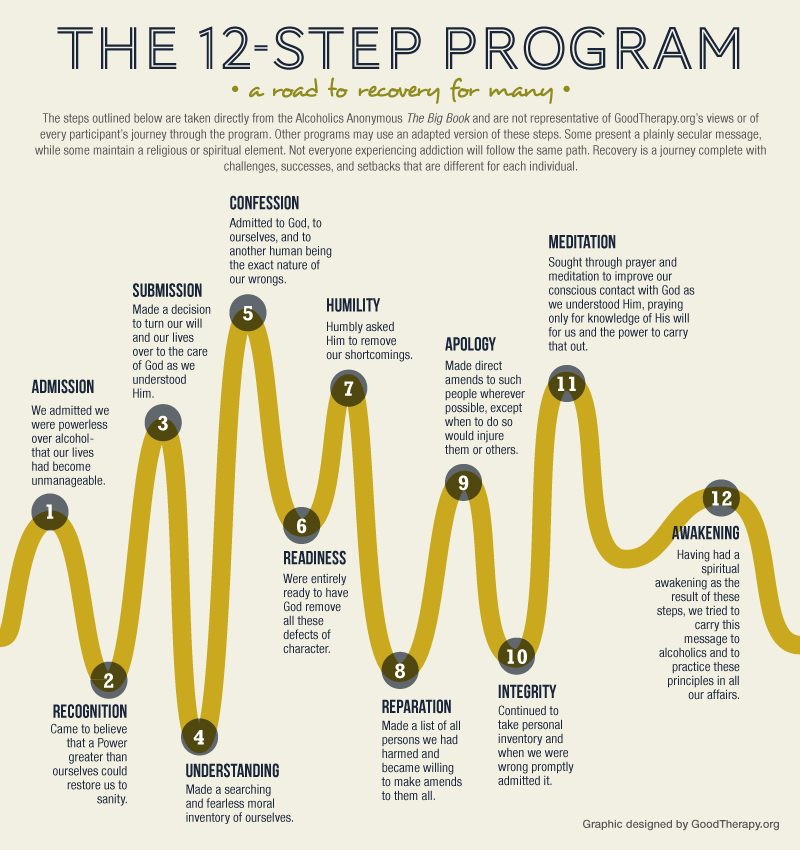12-Step Program
12-step programs consist of a set of uniform steps that attempt to support individuals who wish to address a variety of addictions and behavioral concerns. Developed in 1935 by Bill Wilson and Dr. Bob Smith, the program was originally intended for those who were experiencing alcohol addiction, but it is now widely utilized in the United States to treat a huge array of addictions, including smoking, drug addiction, compulsive overeating, compulsive gambling, and compulsive shopping.
People who are close to someone who is experiencing an addiction can also attend 12-step programs. The steps in these programs are slightly different, as they are tailored to help friends and family, who may be described as codependent, break the destructive patterns the addiction has caused in their lives.The 12 Steps
Each program varies the 12 steps slightly to accommodate the particular addiction it treats. Participants work the steps in order and attend meetings to receive support in completing the steps. Many of those who are recovering from addiction continue to attend meetings even after completing all 12 steps. A desire to help other people who are experiencing addiction is a significant component of a 12-step program. While many of the steps make explicit mention of God, participants need not be religious: They are encouraged to define God however they see fit and to locate a “higher power” upon whom they can rely. However, because many groups also use prayers and Christian doctrine, 12-step programs have been criticized for being overly religious.
Below is an example from Alcoholics Anonymous.

The 12 Traditions
Each 12-step group is an independent entity that determines how its meetings are structured. The 12 Traditions are the guidelines around which each group is structured, and they provide some degree of similarity and continuity between 12-step groups. They outline the premise of the group, the authority, requirements for membership, endorsement and organization policy, and the necessity of anonymity. The Traditions were developed from the original AA guidelines, and when modifying them, other programs substitute the addiction or behavior they treat for alcoholism.
Success Rate
12-step programs are the most popular addiction recovery programs, and many psychiatric hospitals and in-patient rehabilitation facilities offer 12-step support groups as part of treatment for addiction. Though critics of the programs have pointed out that no actual medical treatment is provided to the participants of the programs and that relapse rates are high, the success of these groups continues. The meetings are free, unlike most rehab programs, and anyone who wishes to end an addiction can attend, for any length of time.
References:
- Alcoholics Anonymous: The Big Book (4th ed.). (2002). Retrieved from http://www.aa.org/pages/en_US/alcoholics-anonymous
- Lilienfeld, S., & Arkowitz, H. (2011, February 17). Does Alcoholics Anonymous Work? Retrieved from http://www.scientificamerican.com/article/does-alcoholics-anonymous-work/?page=1
- The 12 Steps. (n.d.). Retrieved from http://www.12step.org/the-12-steps.html
- The Twelve Traditions of Alcoholics Anonymous. (n.d.). Retrieved from http://www.aa.org/en_pdfs/smf-122_en.pdf.
Last Updated: 05-24-2017
- 5 comments
- Leave a Comment
Irene B
July 1st, 2016 at 1:01 AMYour site is really encouraging and I feel that I can get out of my situation now. Thanks for creating this to help people like me.
deon m.
July 18th, 2018 at 2:41 AMHow do I start the 12 step program
Jason R.
September 1st, 2018 at 4:02 AMYou need to find someone who works a 12 Step programme (sponsor) who will guide you through the process.
Leave a Comment
By commenting you acknowledge acceptance of GoodTherapy.org's Terms and Conditions of Use.


